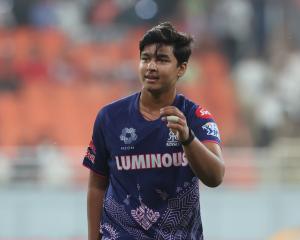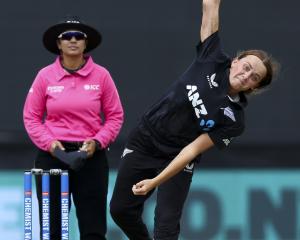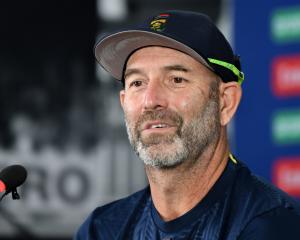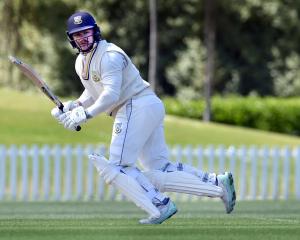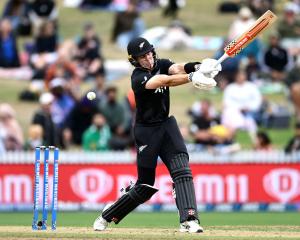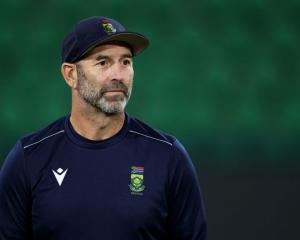Black Cap Jesse Ryder's future in international cricket is over unless the batsman can change his behaviour, New Zealand Cricket chief executive Justin Vaughan says.
The talented left-hander was in contention for a place in the Black Caps' middle order for the first test against England starting in Hamilton on March 5 but injured his hand when he broke a window in a Christchurch bar at 5.30am on Sunday.
The saga has escalated with revelations Ryder had been in a bar at 1.30am on the morning before the final one dayer against England - a clear breach of team protocol - and was abusive to staff at Christchurch Hospital's emergency department while they treated wounds caused by his own actions.
Vaughan last night told Newstalk ZB's Murray Deaker if Ryder wanted to remain in the Black Caps he would have to tackle his problems.
‘‘It will be made clear to Jesse that continuing on with these types of behaviours means that he will not play international cricket again.''
New Zealand team manager Lindsay Crocker earlier said Ryder had been ‘‘rude and disrespectful'' when he turned up to a busy and crowded emergency department with his badly-cut hand on Sunday morning.
Crocker said he had ‘‘caught the tail end of it myself'' when he arrived at the hospital about two hours after the 23-year-old injured himself when punching a plate glass window while trying to access a locked toilet area at a central city bar about 5.30am.
Ryder had been out celebrating New Zealand's 3-1 one-day series win against England, secured in a rain-affected match in Christchurch on Saturday night.
He underwent plastic surgery on Sunday to mend deep cuts to the thumb and index finger of his right hand. ‘‘I heard him being disrespectful to a staff member there,'' Crocker said. ‘‘I ticked him off immediately and from then on he seemed OK.''
Crocker said he later became aware Ryder's abusive behaviour had been going on since his arrival at the emergency department. ‘‘That's clearly unacceptable, so I've talked to him about that as well.''
Crocker said Ryder would write a letter of apology to the hospital and another to his New Zealand team-mates.
He was also understood to be writing to the manager of the Stock Exchange Bar where the injury happened.
Crocker said as part of Ryder's ‘‘punishment'' for abusing medical staff, he would be doing some charity work for the Emergency Care Foundation, which provides equipment for Christchurch Hospital's emergency department and funds some staff there.
Crocker said Ryder did not appear ‘‘absolutely blind drunk'' when he saw him at the hospital, and, having talked to the bar manager, he had no evidence to that effect. However, Crocker confirmed Ryder had been drinking.
He said Ryder's behaviour at the hospital ‘‘may well have been a result of his frustration at what he'd just done to himself and the realisation of the magnitude of what he'd done''.
He said the team still backed Ryder, and a ‘‘programme of support'', including extensive therapy from a psychologist, was being drawn up to help the batsman.
‘‘He can be a successful player, and we're looking to support him any way we can,'' Crocker said.
‘‘We're not discarding him and pushing him away. Quite the reverse.
'In a physical sense, Ryder's chances of extending his international cricket career came within 2mm of being cut for good, his surgeon has revealed.
Howard Klein, of Christchurch, said the 2mm of extensor tendon left unscathed on Ryder's injured left-hand index finger was ‘‘about the smallest'' possible to allow a successful operation.
Glass from the window Ryder's hand went through took off a round piece of skin and tissue about 2.5cm wide on the second knuckle of the finger.
Beneath that, the extensor tendon was almost completely severed at a ‘‘critical location'', with just the 2mm attachment remaining.
‘‘We were able to fix that defect with some of the surrounding tissue, without taking a tendon from some place else,'' Klein said.
The surgeon said he had seen similar injuries heal ‘‘perfectly'' before, when the patient was young and dedicated enough to focus on rehabilitation.
Ahead of Ryder were six weeks ‘‘of no playing at all'' and then a six-week regime of physiotherapy and rehabilitation several times a week. - with NZPA


